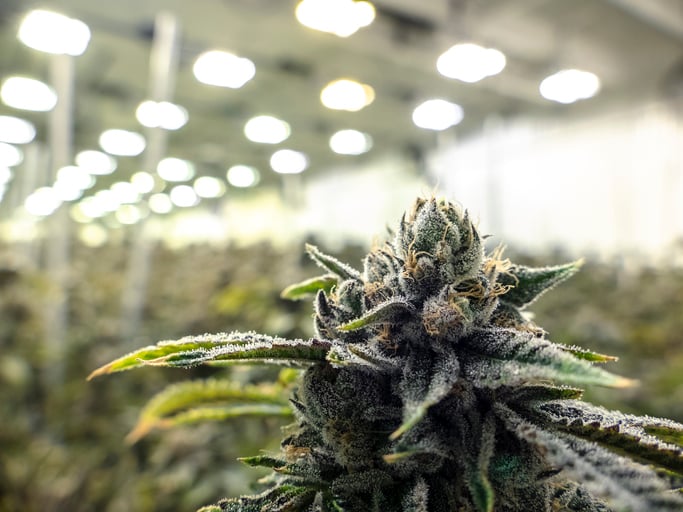Though a lot of marijuana history has been made in recent years, most of it can be attributed to Canada, which became the first industrialized country in the modern era to green-light adult-use cannabis sales in October 2018.
Despite the launch of recreational pot sales not going as planned -- marijuana sales totaled only about 1 billion Canadian dollars (approximately $765 million U.S.) in the trailing 12 months since Oct. 17, 2018 -- Wall Street analysts still believe that Canada could be generating in the neighborhood of $5 billion in annual sales from weed by 2024. This provides a long and bountiful runway for the Canadian pot industry to blossom.
The question is, where to start your research as an investor?
Probably the best answer I can offer is to start with the largest Canadian marijuana stocks. While market cap isn't always indicative of quality or competitive advantage, it offers a good indication that investors see value in the assets or intangibles behind these pot stocks. Without further ado, here are Canada's 10 largest cannabis stocks.

Image source: Getty Images.
1. Canopy Growth: $8.44 billion market cap
Canopy Growth (CGC 0.87%) has held the title of largest cannabis stock for some time now, thanks in part to its 5.6 million square feet of cultivation space spanning 10 growing facilities, and its monstrous cash and short-term investments hoard that topped CA$2.7 billion in the most recent quarter. However, despite being the largest pot stock, Canopy's operating losses have been monstrous due to large amounts of share-based compensation. With the company's goodwill also rising as a percentage of total assets, there's no guarantee Canopy Growth returns to large-cap status anytime soon.
2. Cronos Group: $2.82 billion
Perhaps it's no surprise that No.'s 1 and 2 in cash on hand are first and second in terms of market cap in Canada. Cronos Group (CRON +2.35%) wound up receiving $1.8 billion in mid-March from tobacco giant Altria Group, which took a 45% stake in the company. Having only used its cash to make one acquisition, Cronos is still sitting on more than $1.5 billion in cash and cash equivalents. Unfortunately, it's also been a slow starter in the production department, which makes its $2.8 billion valuation a bit of a stretch, even with its robust cash balance.
3. Aurora Cannabis: $2.24 billion
How the mighty have fallen! Once pushing for large-cap status, Aurora Cannabis (ACB +2.42%) is now trying to just hang onto its mid-cap classification. Largely expected to be the peak production leader, Aurora has suspended construction at Aurora Sun in Alberta, Canada, and Aurora Nordic 2 in Denmark, as well as put its 1-million-square-foot Exeter facility up for sale. These decisions effectively remove around 425,000 kilos of peak annual output from the equation. As a serial share diluter, Aurora Cannabis has a long way to go before earning investors' trust.
4. Tilray: $2.1 billion
Another Canadian pot stock that's declined significantly is Tilray (TLRY +0.00%). Following its initial public offering (IPO), the expectation was that Tilray would utilize its medical cannabis successes and translate those into substantive adult-use market share. However, Tilray's management seems OK de-emphasizing Canadian investments in lieu of investments in Europe and the United States. While these markets could very well outpace Canada in total sales, it's an odd decision to make with Canada's pot market still ramping up. Like Canopy and Aurora, Tilray is unlikely to generate a profit until 2022.

Image source: Getty Images.
5. Aphria: $1.35 billion
Compared to its peers, Aphria (APHA +0.00%) outperformed in 2019 with a decline of only 8%. Now having all three of its cultivation farms licensed by Health Canada, Aphria is slated to be a top-tier grower that could peak at 255,000 kilos of weed per year. Aphria has benefited from the stability of revenue tied to its pharmaceutical distribution subsidiary CC Pharma, but has yet to demonstrate that it can be profitable on a recurring basis without the aid of one-time benefits or fair-value adjustments.
6. OrganiGram Holdings: $493 million
Though OrganiGram Holdings (OGI +0.00%) had a poor 2019 (down 31%), it's still the only Canadian cannabis grower to have generated a no-nonsense operating profit. OrganiGram's Moncton facility offers up a number of competitive advantages, including top-notch operating efficiency, that should lead to better-than-average margins and a faster path to recurring profitability than its peers. While not immune to the supply issues and delayed derivatives launch that impacted the industry, OrganiGram appears to have the tools necessary to succeed over the long run.
7. HEXO: $381 million
Once a billion-dollar pot stock, Quebec-based HEXO (HEXO +0.00%) has been hammered by supply concerns. Having previously forecast CA$400 million in fiscal 2020 sales and 150,000 kilos of peak operating capacity, HEXO has since withdrawn its sales guidance, gone on to idle about a third of its peak operating capacity, and laid off 200 of its workers from a variety of departments. Like a number of other growers here, HEXO looks to be a long way away from profitability, even with its aggressive cost-cutting.
8. MediPharm Labs: $380 million
The first non-grower to appear on the list is extraction-service provider MediPharm Labs (MEDIF 2.30%). However, MediPharm has produced two consecutive quarters of no-nonsense profits, which is a reflection of its central role in processing cannabis and hemp biomass for the resins, distillates, concentrates, and cannabinoids that are being used in high-margin derivative products. Since extraction-service providers like MediPharm Labs often sign processing contracts that are good for 18 to 36 months, both sales and cash flow become highly predictable.

Image source: Getty Images.
9. The Valens Company: $371 million
Right on MediPharm Labs' heels is yet another extraction-service provider, The Valens Company (VLNCF +0.00%). Known as "Valens GroWorks" until its recent name change, Valens also pushed into the profit column in its most recent quarter, and is currently the cheapest marijuana stock in North America, based on its forward price-to-earnings ratio. Having locked in a number of key processing contracts for at least 24 months, Valens Company can ensure it doesn't overspend, and therefore remains profitable.
10. Sundial Growers: $356 million
Last, but not least, Sundial Growers (SNDL +0.00%) clocks in with a market value of $356 million. Sundial came roaring out of the gates following its 2019 IPO, but quickly gave back all of its gains -- and then some -- given Canada's supply issues. Just as worrisome, Sundial has primarily made its living to this point by being a wholesale marijuana supplier. This helps to offload larger quantities of pot, but it's a lower-margin pathway, relative to selling its product in the adult-use market. Sundial plans to transition away from the wholesale business, but this could obviously take some time.











